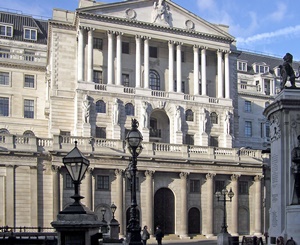Bank of England (BoE) on Tuesday announced a 50 basis point reduction in its policy rate, bringing the Bank Rate to 0.25 per cent. BoE’s Monetary Policy Committee (MPC), at its special meeting on Tuesday, voted unanimously to reduce Bank Rate, in a bid to save the economy of disruptions caused by the impact of the coronavirus.

The MPC also authorised Bank of England to introduce a new term funding scheme with additional incentives for small and medium-sized enterprises (TFSME), financed by the issuance of central bank reserves.
The MPC voted unanimously to maintain the stock of sterling non-financial investment-grade corporate bond purchases, financed by the issuance of central bank reserves, at £10 billion. The committee also voted unanimously to maintain the stock of UK government bond purchases, financed by the issuance of central bank reserves, at £435 billion.
The reduction in Bank Rate is aimed at boosting business and consumer confidence at a difficult time, to bolster the cash flows of businesses and households, and to reduce the cost, and to improve the availability, of finance.
When interest rates are low, it is likely to be difficult for some banks and building societies to reduce deposit rates much further, which in turn could limit their ability to cut their lending rates. In order to mitigate these pressures and maximise the effectiveness of monetary policy, the TFSME will, over the next 12 months, offer four-year funding of at least 5 per cent of participants’ stock of real economy lending at interest rates at, or very close to, Bank Rate. Additional funding will be available for banks that increase lending, especially to small and medium-sized enterprises (SMEs). Experience from the term funding scheme launched in 2016 suggests that the TFSME could provide in excess of £100 billion in term funding, BoE pointed out.
The TFSME will help reinforce the transmission of the reduction in Bank Rate to the real economy to ensure that businesses and households benefit from the MPC’s actions; provide participants with a cost-effective source of funding to support additional lending to the real economy, providing insurance against adverse conditions in bank funding markets; incentivise banks to provide credit to businesses and households to bridge through a period of economic disruption; and
provide additional incentives for banks to support lending to SMEs that typically bear the brunt of contractions in the supply of credit during periods of heightened risk aversion and economic downturns, BoE stated in a release.
To support further the ability of banks to supply the credit needed to bridge a potentially challenging period, the Financial Policy Committee (FPC) reduced the UK countercyclical capital buffer rate from 1 per cent to zero per cent of banks’ exposures to UK borrowers with immediate effect. The rate was due to reach 2 per cent by December 2020.
The FPC expects to maintain the zero rate of interest for at least 12 months, so that any subsequent increase would not take effect until March 2022 at the earliest.
Although the disruption arising from Covid-19 could be sharp and large, it should be temporary, BoE said, adding that such economic disruption should have less of an impact on the core banking system than recent stress tests run by the Bank have shown the system can withstand.
Stress tests have demonstrated that banks would be able to continue to lend to businesses and households even while absorbing the effects of substantial, prolonged economic downturns in both the UK and the global economies, as well as falls in asset prices much larger than experienced in recent weeks, BoE pointed out.
Given the resilience of the core banking system, businesses and households should be able to rely on banks to meet their need for credit to bridge through a period of economic disruption.
The release of the countercyclical capital buffer will support up to £190 billion of bank lending to businesses. That is equivalent to 13 times banks’ net lending to businesses in 2019. Together with the TFSME, this means that banks should not face obstacles to supplying credit to the UK economy and to meeting the needs of businesses and households through temporary disruption.
The FPC and the Prudential Regulation Committee (PRC) will monitor closely the response of banks to these measures as well as the credit conditions faced by UK businesses and households more generally.
Bank of England has operations in place to make loans to banks in all major currencies on a weekly basis. Banks have pre-positioned collateral with the Bank of England enabling them to borrow around £300 billion through these facilities.
BoE said it is coordinating actions with those of the treasury as also with international counterparts.
The Bank will take all further necessary steps to support the UK economy and financial system, consistent with its statutory responsibilities, it added.



















